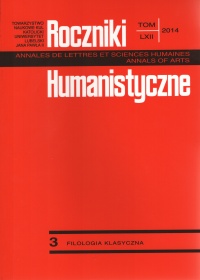Is a Woman a Monster? The Female Sex in Aristotle’s De Generatione Animalium
Abstract
In recent years there have been published many critical feminist studies of Aristotle, especially concerning philosopher’s views on females. According to feminist scholars Aristotle’s claims about female sex, even in his biological writings, are the result not of honest science, but of “male bias” and misogynist ideology typical of ancient Greek men: the female is for Stagirite a “deficient male,” a teleological failure, a kind of “monster” whose birth results from pure material necessity. In this paper I admit that Aristotle’s account of the female sex provides some kind of rationalization of Greek social attitudes, but I also try to argue that his conclusions about females are, above all, influenced by his philosophical theories. In may opinion, the female, which in Aristotle’s biological writings—particularly in his embryology—is related to the matter and privation, is not a “monster,” but embodies one of the principles maintaining the existence of the whole universe, and, as such, is necessary not only accidentally, but also teleologically.
References
Aristotelis Opera ex recognitione Immanuelis Bekkeri. Editio altera quam curavit O. Gigon. Berolini 1960.
Aristotle: Generation of Animals with an English translation by A. L. Peck, The Loeb Classical Library, Cambridge: Harvard University Press 1953.
Arystoteles: Dzieła wszystkie, t. I-VI, Warszawa: PWN 1990-2001.
Asma S.T.: On Monsters: An Unnatural History of Our Worst Fears, Oxford: Oxford University Press 2009.
Beauvoir S. de.: Druga płeć, przeł. G. Mycielska, M. Leśniewska, Warszawa: Wydawnictwo J. Santorski 2003.
Coles A.: Biomedical Models of Reproduction in the Fifth Century BC and Aristotle’s Generation of Animals, „Phronesis” (40) 1994/1, s. 48-88.
Cooper J.M.: Metaphysics in Aristotle’s Embryology, „Proceedings of the Cambridge Philological Society” (34) 1988, s. 14-41.
Deslauriers M.: Sex and Essence in Aristotle’s “Metaphysics” and Biology, w: Feminist Interpretation of Aristotle, s. 136-167.
Discovering Reality (Second Edition): Feminist Perspectives on Epistemology, Metaphysics, Methodology, and Philosophy of Science, ed. by Sandra Harding and Merrill B. Hintikka, Dordrecht–Boston: Kluwer Academic Publishers 2003.
Engendering Origins: Critical Feminist Readings in Plato and Aristotle, ed. by Bat-Ami, Bar On, Albany: State University of New York Press 1994.
Feminist Interpretation of Aristotle, ed. C. Freeland. Pennsylvania: Penn. State University Press 1998.
Freeland C.A.: Nourishing Speculation: A Feminist Reading of Aristotelian Science, w: Engendering Origins, s. 145-177.
Granger H.: The Scala Naturae and the Continuity of Kinds, „Phronesis” (30) 1985/2, s. 181-200.
Henry D.: Aristotle on the Mechanism of Inheritance, „Journal of the History of Biology” (39) 2006, s. 425-455.
Henry D.: Embryological Models in Ancient Philosophy, „Phronesis” (50) 2005/1, s. 1-42.
Henry D.: How Sexist is Aristotle’s Developmental Biology?, „Phronesis” (52) 2007, s. 251-269.
Lange L.: Woman is not a Rational Animal: on Aristotle’s Biology of Reproduction, w: Discovering Reality, s. 1-15.
Mayhew R.: The Female in Aristotle’s Biology: Reason or Rationalization, Chicago: University of Chicago Press 2004.
Nielsen K.M.: The Private Parts of Animals: Aristotle on the Teleology of Sexual Difference, „Phronesis” (53) 2008, s. 373-405.
Senack Ch.M.: Aristotle on the Woman’s Soul, w: Engendering Origins, s. 223-236.
Tuana N.: Aristotle and the Politics of Reproduction, w: Engendering Origins, s. 178-206.
Witt Ch.: Form, Reproduction, and Inherited Characteristics in Aristotle’s “Generation of Animals”, „Phronesis” (30) 1985/1, s. 46-57.
Copyright (c) 2014 Roczniki Humanistyczne

This work is licensed under a Creative Commons Attribution-NonCommercial-NoDerivatives 4.0 International License.





